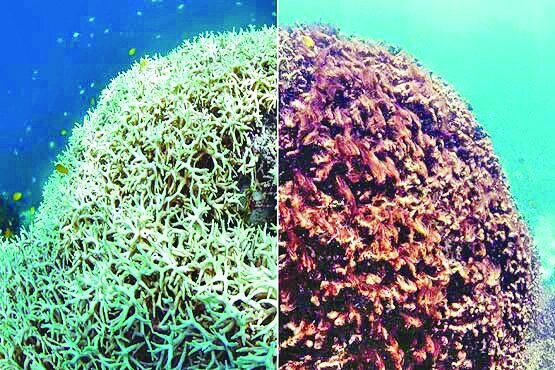INSUBCONTINENT EXCLUSIVE:
bleaching phenomenon of corals in the Indian Ocean are the consequences of climate change.The rising temperature is one of the phenomena
that is strongly affected by climate change
Because the increase in temperature will cause a lack of oxygen in aquatic environments, ISNA quoted Ali Mehdinia as saying.He also said
that the increase in temperature causes acidification of the Indian Ocean water, which will affect the ecosystem of Iran's coasts, such as
corals and mangrove forests.The smallest change in sea life affects the spawning system of marine animals such as turtles, which is why many
much as the industrial facilities expand on the coasts of Oman, this will lead to the release of carbon dioxide in the environment, which
on the effects of climate change on the marine environment of the Indian Ocean was held in Tehran.In this three-day workshop, experts from
South Africa, Sri Lanka, India, and the countries bordering the Indian Ocean are present.The Indian Ocean Rim Association Regional Centre
for Science and Technology Transfer (IORA RCSTT), the Iranian Research Organization for Science and Technology (IROST), the Iranian National
Institute for Oceanography and Atmospheric Sciences (INIOAS), and the Regional Education and Research Centre on Oceanography for West Asia
organized the workshop.The aim of the workshop was to enhance the knowledge of Member States and share information on the impacts of climate
change on the marine environment.The specific objectives were to promote sharing knowledge and findings on the effects of climate change on
various aspects of the marine environment and ecosystem.The Indian Ocean, as the third-largest body of water in the world, plays an
important role in the economy, ecosystem, and weather from local to global scales.Many properties of the Indian Ocean, can be fundamentally
influenced by climate change
Climate change is rapidly impacting the weather, ecosystems, and life of more than two billion people.The impacts of climate change are
putting increasing pressure on both marine and terrestrial environments, through more extreme weather conditions that also increase the
likelihood of natural disasters.Climate change is predicted to result in an increase in global temperatures, sea level rise, ocean
acidification, more intense tropical cyclones, and an increase in the frequency, intensity, or duration of extreme weather events.It is
predicted that climate change-driven disturbance will have a negative effect on water supply; food security; health, industry, settlement,
and society, especially for those located in coastal areas and river flood plains.In addition, climate change would also impact natural
systems and resources, infrastructure, and labor productivity which may lead to reduced economic growth and increasing poverty and
inequality.Therefore, the investigation of climate change effects from different points of view, from marine environment/biodiversity to

